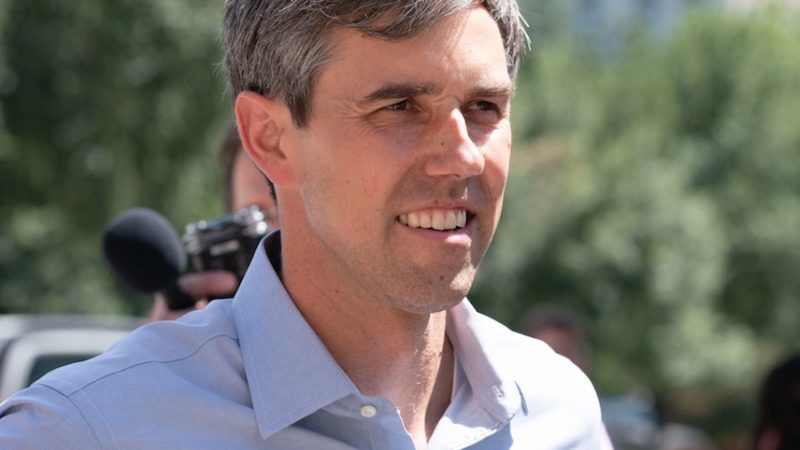The Only Remarkable Thing About Beto O'Rourke Is How Much the Media Love Him
No, Beto O'Rourke isn't "shaking up" the Senate race in Texas.

Despite my best efforts, I know exactly what Senate candidate Beto O'Rourke's post-punk indie band from the mid-'90s sounds like (not so bad as you'd think!). At the same time, I don't know much about Senate candidate Josh Hawley, who is 38 years old (meaning about eight years younger than "rising star" Beto) and the attorney general of Missouri.
In fact, Hawley's name recognition outside his state is practically nonexistent. When his name does come up in national political coverage, it's mostly as a tack-on in pieces assessing opponent Claire McCaskill's latest face-saving move or a panicky story about voter registration in Missouri. As with most other Americans, I don't have any idea whether Hawley likes to air-drum to The Who when he pretends to win a debate. What I do know is that Hawley is slightly leading McCaskill, a two-term Democratic senator, in the RealClearPolitics poll average in a race that could decide which party controls the Senate.
Democrat O'Rourke, who is also in a race against an incumbent, Ted Cruz, is down 7 points and falling. It wouldn't be completely surprising if Cruz ended up winning Texas by the same margin he did in 2012. Yet you might not discern this reality by merely paying attention to Betomania.
As with Hawley, I didn't know much about Arizona's GOP Senate nominee, Martha McSally, either. I'm probably not alone. She didn't get to kibitz with Stephen Colbert or Ellen DeGeneres. Maybe she'd have better luck getting attention from the national media if she used a nickname given to her as a teen. Anyway, what could one of the highest-ranking female pilots in the history of the Air Force and the first female pilot to go on a combat mission possibly have to offer Colbert's audience? Beto once skateboarded through a Whataburger parking lot.
Also, McSally has a chance to win her Senate race.
So I'm sorry, Associated Press and LeBron James, but Beto O'Rourke isn't "shaking up" the Senate race in Texas any more than Hawley and McSally are shaking up the Missouri and Arizona races. You're just far more interested.
Then again, Hawley and McSally are not inventions of the media. O'Rourke has raised $38 million thus far. It's an immense amount for any politician but an absurd one for a man who relies on fawning coverage provided to him and the advocacy that has very little to do with his political race.
It's difficult to quantify these things, but it may be true that all the money being poured into a losing O'Rourke campaign in Texas might have been better utilized in closer races in other red states—namely, North Dakota and Tennessee. Democrats seem more interested in subsidizing celebrity than winning back the Senate.
In a Bloomberg article headlined "Beto O'Rourke Matters Even If He Loses," Francis Wilkinson says: "O'Rourke's extraordinary political success is all the more poignant because it comes after a wave of public polls registering that he is on course to lose in November." This is the kind of self-perpetuating back-patting that liberal advocates in the media like to engage in.
O'Rourke's "extraordinary political success" is illusionary. His national popularity is contingent on aesthetics and mass of coverage. It is merely that Beto looks and acts like the type of guy producers at most cable news networks and talk shows think a senator should look and act like—unlike, say, Cruz (nearly two years older than Beto), who is always blathering about the Constitution and whatnot.
It's not as if O'Rourke is a special talent by any measure. His speeches and talking points are just as vacuous and predictable as those of any other middling politician. His positions on guns and abortion—and a multitude of other issues—are in lockstep with his party, not the state. O'Rourke has never offered any substantively impressive policy ideas. He has not led on any notable issues in the House. He's remarkably unremarkable.
There is talk that Beto's showing makes him a young Barack Obama. It's true that both men exhibit similar sensibilities. Then again, I remember Obama making his name opposing the Iraq War, something most of his party was scared to do. I remember him winning a Senate race.
Of course, winning a political race doesn't make you substantively right. Winning says little about the veracity of your arguments. But it does say plenty about the reality of politics. Now, maybe O'Rourke will pull it out. Polls have been wrong before. Perhaps in the new political reality, celebrity is enough. But the way the media treat a losing candidate is just another sign of its bias, advocacy, and wishful thinking.


Show Comments (177)